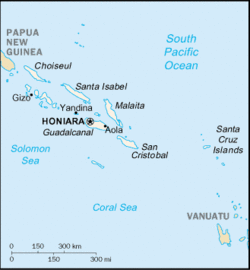Solomon Islands: Difference between revisions
imported>Howard C. Berkowitz (New page: The '''Solomon Islands''' are an independent republic, made up of a archipelago of islands in the South Pacific Ocean, southeast of Papua New Guinea and northwest of Vanuatu. They ...) |
imported>Howard C. Berkowitz No edit summary |
||
| Line 1: | Line 1: | ||
{{subpages}} | |||
The '''Solomon Islands''' are an independent republic, made up of a archipelago of islands in the South Pacific Ocean, southeast of [[Papua New Guinea]] and northwest of [[Vanuatu]]. They are a member of the [[Commonwealth of Nations]]. | The '''Solomon Islands''' are an independent republic, made up of a archipelago of islands in the South Pacific Ocean, southeast of [[Papua New Guinea]] and northwest of [[Vanuatu]]. They are a member of the [[Commonwealth of Nations]]. | ||
[[Image:Solomons-map.gif|thumb|250px|Solomons Islands]] | [[Image:Solomons-map.gif|thumb|250px|Solomons Islands]] | ||
Revision as of 11:25, 18 February 2009
The Solomon Islands are an independent republic, made up of a archipelago of islands in the South Pacific Ocean, southeast of Papua New Guinea and northwest of Vanuatu. They are a member of the Commonwealth of Nations.
Geography
The total land area is 27,540 sq km; there are 910 sq km of water inside the territorial limits. They are in a key location on sea routes through the South Pacific Ocean, the Solomon Sea, and the Coral Sea.
Organized into a 9 provinces and a central district: Central, Choiseul, Guadalcanal, Honiara*, Isabel, Makira, Malaita, Rennell and Bellona, Temotu, Western Key; the islands and island groups include:
- Guadalcanal, on which the capital of Honaria is located
- Choiseul Island
- Gizo Island
- Yandina Island
- Santa Cruz Islands
- [[San Cristobal
- Malaita Island
- Rennell Island
The much-fought-over waters of North Georgia Sound called the "Slot" is north of Guadalcanal, containing Savo Island.
History
In the 1890s, Britain established a protectorate over the islands.
Second World War
Some of the most intense combat of World War II on the islands and waters of this area, beginning with the Battle of the Coral Sea and the Gudalcanal campaign.
Independence
Self-government was achieved in 1976 and independence two years later. Ethnic violence, government malfeasance, and endemic crime have undermined stability and civil society.
Assistance
In June 2003, then Prime Minister Sir Allan Kemakeza asked for Australian assistance to reestablish law and order. In July, the Australian-led multinational force arrived to restore peace and disarm ethnic militias, and has remained effective.[1]
Economy
The bulk of the population depends on agriculture, fishing, and forestry for at least part of its livelihood. Most manufactured goods and petroleum products must be imported. The islands are rich in undeveloped mineral resources such as lead, zinc, nickel, and gold. [1]
RAMSI was able to rebuild the economy, damaged by violence.
References
- ↑ 1.0 1.1 Central Intelligence Agency, Solomons Islands, The World Factbook
